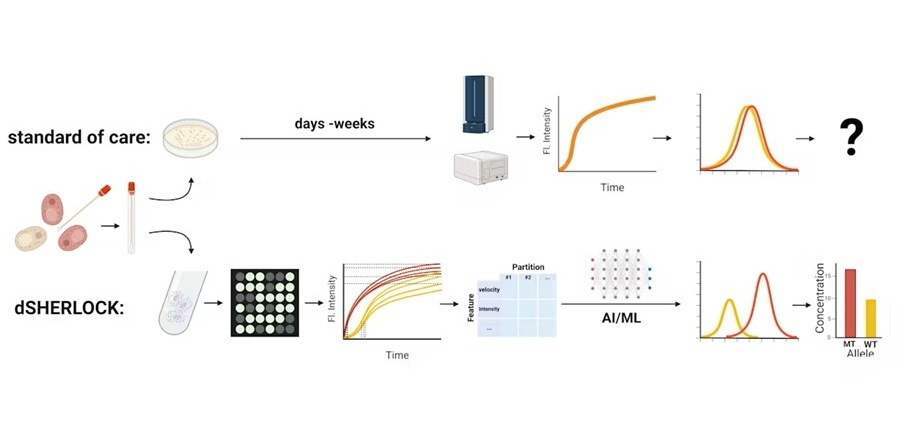Rapid DNA Amplification Assay Detects Cryptosporidium in Stool Samples
By LabMedica International staff writers
Posted on 19 Feb 2014
A newly developed RPA (Recombinase Polymerase Amplification) lateral flow assay rapidly and accurately detected the parasite Cryptosporidium in stool samples.Posted on 19 Feb 2014
Cryptosporidiosis, one of the most common waterborne diseases found worldwide, is a parasitic disease caused by the protozoan parasite Cryptosporidium. The parasite is transmitted by environmentally hardy microbial cysts (oocysts) that, once ingested, exist in the small intestine and result in an infection of intestinal epithelial tissue. The parasite disturbs the intestines and typically causes acute, self-limiting diarrhea. In immunocompromised individuals, such as AIDS patients, the symptoms are particularly severe and often fatal. Treatment is symptomatic, with fluid rehydration, electrolyte correction, and management of any pain.
Investigators at Rice University (Houston, TX, USA) have developed a novel nucleic acid test to detect the presence of Cryptosporidium species in DNA extracted from stool samples. The assay uses the RPA isothermal amplification technique to amplify trace amounts of pathogen DNA extracted from stool to detectable levels in 30 minutes; products are then detected visually on simple lateral flow strips.
Recombinase Polymerase Amplification (RPA) is a single tube, isothermal alternative to the Polymerase Chain Reaction (PCR) method for DNA application. Since it is isothermal, RPA reactions operate with simpler equipment than PCR, which requires a thermal cycler. The RPA process employs three core enzymes—a recombinase, a single-stranded DNA-binding protein (SSB), and strand-displacing polymerase. Recombinases are capable of pairing oligonucleotide primers with homologous sequence in duplex DNA. SSB bind to displaced strands of DNA and prevent the primers from being displaced. Finally, the strand displacing polymerase begins DNA synthesis where the primer has bound to the target DNA. By using two opposing primers, much like PCR, if the target sequence is indeed present, an exponential DNA amplification reaction is initiated. No other manipulation of the sample such as thermal or chemical melting is required to initiate amplification. At optimal temperatures (37–42 degrees Celsius), the reaction progresses rapidly and results in specific DNA amplification from just a few target copies to detectable levels, typically within 5 to 10 minutes,
An RPA-based Cryptosporidium assay (RPAC assay) was developed and optimized using DNA from human stool samples spiked with pathogen. It was then tested using DNA extracted from the stools of infected mice, and it correctly identified the presence or absence of the parasite in 27 out of 28 stool samples. Finally, the assay was tested using DNA extracted from the stool of infected patients, and it correctly identified the presence or absence of the parasite in 21 out of 21 stool samples.
The RPAC assay was integrated into a foldable, paper and plastic device that enabled DNA amplification with only the use of pipettes, pipette tips, and a heater. The method required little equipment, as the enzymes that amplify DNA worked best at or near body temperature. The performance of the integrated assay was comparable to or better than PCR, without requiring the use of thermal cycling equipment. Furthermore, RPA enzymes are stable in dried form and can be stored safely without refrigeration for up to a year.
“Diarrheal illness is a leading cause of global mortality and morbidity,” said senior author Dr. Rebecca Richards-Kortum, professor of bioengineering at Rice University. “Parasites such as Cryptosporidium are more common causes of prolonged diarrhea. Current laboratory tests are not sensitive, are time-consuming, and require days before results are available. A rapid, affordable, accurate point-of-care test could greatly enhance care for the underserved populations who are most affected by parasites that cause diarrheal illness.”
The study was published in the January 30, 2014, online edition of the journal Analytical Chemistry.
Rice University



![Image: Nomarski interference contrast photomicrographs of Cryptosporidium muris from the feces of an HIV-positive human. Scale bars = five micrometers (Photo courtesy of the CDC – [US] Centers for Disease Control and Prevention). Image: Nomarski interference contrast photomicrographs of Cryptosporidium muris from the feces of an HIV-positive human. Scale bars = five micrometers (Photo courtesy of the CDC – [US] Centers for Disease Control and Prevention).](https://globetechcdn.com/mobile_labmedica/images/stories/articles/article_images/2014-02-19/GMS-046a.gif)











